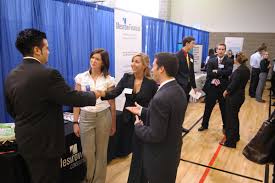It’s a big week for career fairs at the University of Illinois! The Business Career Fair takes place at the ARC this Wednesday, Feb. 3 and Thursday, Feb 4 from 2 to 6 pm, and the Arts and Culture Career Fair takes place in Chicago (UIC Student Center East (3rd Floor)) this Friday, Feb. 5 from 12 to 2 pm. And there’s a host of other career fairs scheduled later in February and March, which we encourage you to attend!

Last week, Laura Miller, a senior in English; Kenny Miller a senior in Creative Writing; and Kirstin Wilcox, the English Department’s Director of Internships offered some advice about how to be successful at the upcoming career fairs. Here’s what they had to say:
Start going to career fairs early in college, and go multiple times
As with most things in life, you’ll perform better at career fairs with experience. So don’t wait until Spring semester of your senior year to dust off your professional attire for your first campus career fair.* Challenge yourself to go to a career fair as a freshman, sophomore, or junior, even if you aren’t sure yet what you want to do after graduation. Each time you go, you’ll become more comfortable with the process. Think of your first career fair experience(s) as a trial run, an opportunity to work through issues in your elevator pitch or your interviewing strategies. If the first time doesn’t go well, don’t get discouraged! Use it as a learning experience, and know t hat you’ll be better off the next time you go because you’ll know what to expect.
hat you’ll be better off the next time you go because you’ll know what to expect.
(*If you’re reading this now as a graduating senior and you haven’t yet attended a career fair, don’t panic! You can still be successful at the upcoming career fairs!)
Do your research ahead of time
You should read about each of the companies and their available positions online at least a couple days before the career fair. Companies attending the Business Career Fair are listed on I-Link (if you’re unfamiliar with I-Link, check out handy tutorials here and here); organizations at the Arts and Culture Career Fair are listed here. Once you’ve identified positions you’re interested in, research the company or organization and particular positions further. Give yourself time to explore, since many companies and organizations will be in attendance. As you conduct research, prepare specific questions for career fair recruiters that will demonstrate your familiarity with the company and your interest a position.
Be able to narrate what you can do
As you well know if upon disclosing your major you’ve ever been asked “What do you plan to do with that?”, people with backgrounds outside the humanities may have a limited understanding of the professional skillset English majors possess. While some may think the English major is essentially a large-scale book club, in reality your English major has given you years of experience analyzing and synthesizing massive amounts of information, conducting independent research, compiling a logical and persuasive survey of that research, communicating to diverse audiences through multiple mediums and in varying contexts, evaluating and offering constructive feedback on peers’ work, and so much more. At the Business Career Fair, where you might anticipate facing some scrutiny as an English or Creative Writing major, emphasize what you can do. In conversations with recruiters, lead with your skills. Prepare a pitch ahead of time that foregrounds the breadth of your skillset, and make a case for your value to a company with confidence.
At the Business Career Fair, use synonyms for “writing”
As the saying goes, when in Rome, do as the Romans do. So, when at the Business Career Fair, use lingo familiar to corporate recruiters. At Business and Engineering career fairs, you may have more luck if you substitute synonyms where you might typically use “writing.” Some great business-friendly substitutes for “writing” include content (content creation, content delivery, content management, content development), communication (technical communication, professional communication, creative communication), information (managing information, sharing information), and social media (specify your platforms). You can also convey your skills by explaining what you can accomplish with words: telling a story, starting a conversation, persuading people to , creating a connection, advocating, informing, teaching. As you conduct research before the career fair, you might note what terms the companies use in their job postings and use those same terms in your conversation with the recruiter.
Don’t try to be someone you’re not
Embrace your unique skillset as an English student, and prepare an authentic, compelling elevator speech ahead of time that highlights your skills and experiences. Having self-confidence and a passion for what you do can make you stand out. And though you may feel self-conscious about being a humanities student among hundreds of Business majors, your uniqueness can make you memorable and may be refreshing to recruiters.
Additional tips:
- You can make a free professional-looking nametag for the Business Career Fair ahead of time at the Career Center. (If you register in advance for the Arts and Culture Career Fair, there will be a nametag for you at the event.)
- You can get a free professional photo taken at the Business Career Fair. If the line for photos is long, you might get a photo taken after you’ve talked to recruiters. This could be a great photo to use on your LinkedIn profile!
- For the Business Career Fair, bring one copy of your résumé for each company you hope to talk to. For the Arts & Culture Career fair, you should bring résumés for each organization you’re interested in, plus 3 to 5 extra.
- Because your résumé should tell a story about why you’re the person for a particular job, you may want to tailor your résumé to specific positions, in which case you may want to bring multiple versions of your résumé. If you do make multiple versions, be sure you remember which version you plan to use for each company.
- If you have a suit for the Business Career Fair, great! Wear it. If you don’t have a suit, you don’t have to go out and buy one to do well at the Business Career Fair. Just do your best to blend in by wearing nice, inconspicuous business attire. Choose a conservative color scheme and tone down (or skip) the accessories.
- If you’re going to the Arts and Culture Career Fair, you’ll likely look out of place if you wear a suit. Instead, women should wear a blouse and nice skirt or a dress (that goes at least to your knees); comfortable, professionally appropriate shoes (flats or dressy boots); and possibly a memorable, colorful accessory, like a scarf. Men in attendance should wear a jacket and nice pants, but a tie isn’t necessary.
- Make notes on the back of business cards after you’ve talked with someone, especially if you have a good conversation.
- Send follow-up emails to the recruiters with whom you spoke, attaching a PDF of your résumé, conveying your interest, describing follow-up actions, and including LinkedIn or other relevant social media links in your signature line.
You can read more on our website about the Arts and Culture Career Fair and how to prepare for it, or visit the Facebook event page.
If you’d like to review your resume, practice your pitch, discuss the pros and cons of attending, or practice parsing job descriptions, make an appointment with Kirstin Wilcox by emailing kwilcox@illinois.edu.
